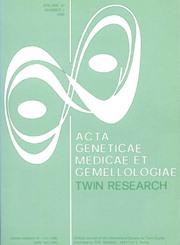No CrossRef data available.
Article contents
Classification of Psychotic Disorders from a Genetic Point of View
Published online by Cambridge University Press: 01 August 2014
Extract
In musing upon my assignment for this Congress, I became aware of limitations that I must impose upon myself, inherent in the title of the address. First, the words “Psychotic Disorders” point to the fact that the whole province of Psychiatry is not included in its scope, and whilst it is pertinent to include with the psychoses, suicide, which is a not infrequent feature of the psychotic disorders, and the epilepsies, which commonly have a psychotic aspect, the large areas of the psychiatric field characterized as mental defect, psychoneurosis, psychosomatic conditions, psychopathic personalities, and sexual deviations (including homosexuality) are not relevant to to-day's talk. Nor is it my prerogative to treat of recent developments in the realm of chromosome anomalies, such as the trisomy underlying Mongolism, karyotypes and the sexing of cells. In the second place, the term “Classification” suggests to me that my task is to confine myself to the findings of genetic studies in our field of discourse and not stray into the tempting pastures of eugenics, or biochemical genetics with its rich promise of reversibility and cure by modern pharmaceutical means. Even now with our feet firmly on the ground of genetic fact, after this preliminary delimitation, we are not entirely free on the semantic side of things, for, if I mistake not, some appearance of ambiguity would seem to lurk in our title. Is its meaning that within the discipline of Psychiatry we are to attempt a classification of the psychoses from a genetic point of view, or, is it that as an exercise within the realm of Genetics we are seeking to classify the specific and non-specific hereditary mechanisms, which have been postulated as underlying different psychotic disorders? I incline to the view that both of these programmes are significant, and appropriate to the endeavour to which this paper is dedicated.
- Type
- Sessione di Conferenze/Lecture Session (11 Settembre)
- Information
- Acta geneticae medicae et gemellologiae: twin research , Volume 11 , Issue 3 , July 1962 , pp. 321 - 332
- Copyright
- Copyright © The International Society for Twin Studies 1962


